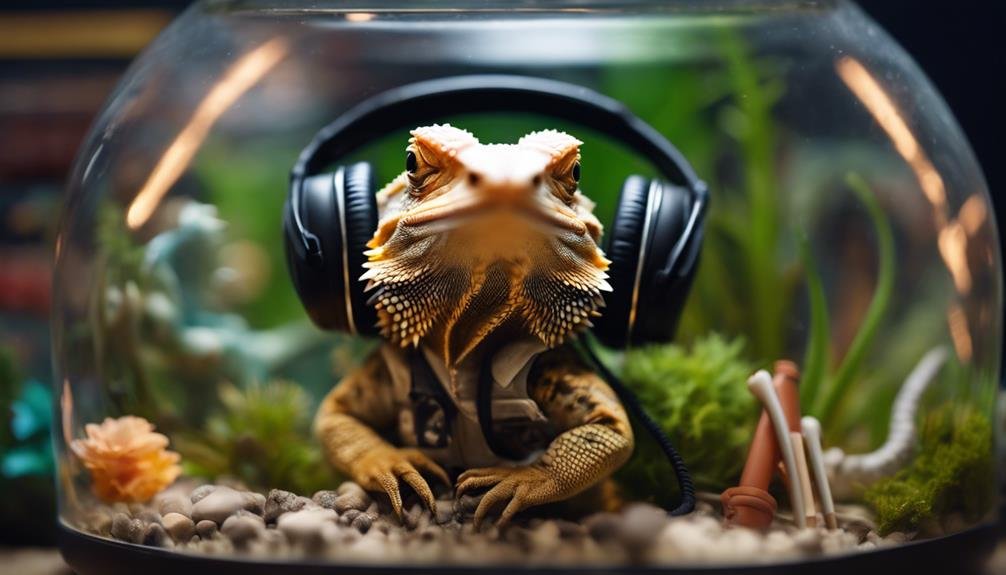You might find yourself surprised to learn that your bearded dragon could actually enjoy music, experiencing positive effects on their well-being. When you play calm, soft tunes, such as classical or mellow pop, you’ll notice signs of relaxation and contentment in your scaly friend. It’s fascinating to observe their reactions and discover their musical preferences, which can greatly contribute to creating a serene environment. However, the question remains: what specific genres do they prefer, and how can music influence their mood and health? Let’s explore how tailoring your music selection could lead to a happier, more relaxed bearded dragon.
Key Takeaways
- Bearded dragons show interest in calm and soft music, indicating a preference for these genres.
- Classical music can help bearded dragons feel relaxed and content, uplifting their mood.
- Observing positive behaviors, such as a relaxed posture, suggests enjoyment and comfort from music.
- Tailoring music choices to their preferences, especially soothing sounds, enhances their well-being.
- Minimizing stress and creating a peaceful atmosphere through music benefits bearded dragons’ overall mood and health.
Auditory Structure Insights
Did you know that bearded dragons possess well-developed ears, hidden under protective scales, enabling them to detect a broad spectrum of sounds? These remarkable reptiles have their ears strategically placed on the sides of their heads, covered with scales that act as a shield against debris while allowing sound waves to pass through. Their auditory range is quite impressive, spanning from 500 to 4,000 hertz, which is quite similar to the human auditory range. This allows bearded dragons to hear a variety of sounds, from the low hum of a distant predator to the high-pitched call of a mate.
The secret behind their keen hearing lies in the structure of their inner ear, which contains three small bones that play a pivotal role in sound detection. These tiny bones vibrate in response to sound waves, enabling the dragon to interpret a wide range of frequencies. This auditory capability isn’t just for show; it’s essential for their survival. It aids in communication with other bearded dragons, alerts them to the presence of predators, and helps them stay aware of their environment. So, next time you’re near a bearded dragon, remember, they’re listening!
Observing Reactions to Music
When exposing bearded dragons to music, you may notice a range of reactions from interest and curiosity to signs of stress, depending on their individual personalities and past experiences. Observing how bearded dragons respond to music is important in understanding its impact on them. You’ll want to pay close attention to their behavior and body language. Positive reactions might include a relaxed posture or even an attentive orientation towards the sound source, indicating that the music creates a comforting environment for them.
On the flip side, signs of a stressed bearded dragon shouldn’t be ignored. If you observe your bearded dragon hiding more than usual, pacing back and forth, or showing increased aggression, these could be indicators that the music isn’t sitting well with them. Such behaviors suggest the need to adjust the musical environment to guarantee it’s enhancing, not detracting from, their well-being.
Creating a peaceful atmosphere is key. Opting for calming music can greatly impact their comfort level, making your bearded dragon’s habitat a serene place to thrive. Always remember, each dragon is unique, and adapting to their preferences is vital for their happiness and health.
Musical Preferences Uncovered


Understanding how bearded dragons react to music leads us to explore what types of melodies they prefer. Observing your beardie’s behavior when exposed to different music genres is key to understanding their musical preferences. Generally, bearded dragons show a penchant for calm and soft music, creating a relaxing environment that they seem to enjoy.
When you’re playing music around your beardie, pay attention to their reactions. Signs that they’re enjoying the tunes include being more active, playful, and even displaying brighter colors. These positive behaviors suggest that the music is creating an enjoyable atmosphere for them.
On the other hand, it’s essential to steer clear from music that might cause stress, which is why playing beardie-specific music, tailored to their preferences for specific genres, is highly recommended.
Signs of Discomfort
If your bearded dragon starts showing signs of discomfort like pacing or hiding, it’s important to reassess the musical atmosphere you’ve created for them. Noticing changes in behavior, such as increased aggression or a tendency to hide more often, can be clear indicators that the music might be causing stress. It’s crucial to recognize these signs early on to guarantee your pet’s environment is as comfortable as possible.
Aggressive behavior, including snapping or flaring up, can also emerge if the music is too loud or the rhythm too fast for your bearded dragon’s liking. This stress response is a sign that you need to adjust either the volume or the type of music you’re playing. Opting for softer, calmer tunes could greatly reduce their discomfort.
Choosing Suitable Genres


Selecting the appropriate music genre can greatly enhance your bearded dragon’s environment, reducing stress and promoting relaxation. Playing music that’s calm and soft is key, as loud or aggressive tunes might lead to discomfort. When you’re choosing musical genres to play, consider calming music that fosters a serene atmosphere. This could include genres known for their soothing qualities, such as classical, jazz, or even some mellow pop and country tracks.
Observing your bearded dragon’s behavior when exposed to different types of music is essential. You might notice that they’ve genre preferences, showing more contentment or activity with jazz, for instance, over blues. This variation underscores the importance of paying attention to their reactions, as it reveals their unique personalities and preferences.
Identifying Contentment Cues
To identify when your bearded dragon is enjoying the music, look for contentment cues such as a relaxed posture and open, curious eyes. When you’re playing tunes, these signs indicate they’re not just hearing but may actually enjoy music. A relaxed body language, especially basking in the warmth while the music plays, shows they’re at ease. You’ll notice they may have slow movements, devoid of any stress marks, signaling they don’t feel uneasy with the sounds filling their environment.
Bearded dragons that respond positively to music might also show a keen curiosity towards the source of the sound. You might see them exploring their enclosure further or positioning themselves closer to the speakers. This exploration behavior is a good sign they’re engaged and not distressed by the melodies.
Additionally, if they settle under their heat lamp or in a favored spot while you’re playing music, it’s a clear indicator of their contentment. Keep an eye out for calm breathing and steady movements, as these are additional cues that your bearded dragon is comfortable and might indeed enjoy the musical ambiance you’ve created for them.
Addressing Stress From Noise


While recognizing signs of contentment is important, it’s equally vital to identify and address any stress caused by noise in your bearded dragon’s environment. Loud noises, such as blaring alarms or loud music, can startle and distress bearded dragons, leading to discomfort. It’s crucial to monitor their behavior for signs of discomfort, which may indicate illness or stress, including lethargy or hiding.
Creating a quiet and calm environment is key to preventing stress in bearded dragons due to noise. Here are steps you can take to guarantee your bearded dragon’s well-being:
- Limit Exposure to Loud Noises: Keep the volume of music and other sounds at a minimum to avoid startling your bearded dragon.
- Monitor for Signs of Discomfort: Look for behaviors like hiding or lethargy, which can indicate stress or illness.
- Create a Quiet Environment: Ensure to maintain a peaceful and serene habitat for your bearded dragon, minimizing exposure to loud or sudden noises.
- Adjust the Environment as Needed: If you notice signs of discomfort, take steps to reduce noise levels and create a more bearded dragon-friendly atmosphere.
Well-being Benefits Explored
You’ve seen how music affects bearded dragons, now let’s focus on the well-being benefits it brings.
By choosing calm tunes, you can greatly reduce their stress and enhance their mood.
It’s all about creating a serene atmosphere that keeps them content and at ease.
Stress Reduction Benefits
How does music contribute to the well-being of your bearded dragon? Understanding the stress reduction benefits that music, especially classical tunes, can provide is crucial. Bearded dragons enjoy listening to calm and soothing sounds, which greatly contributes to their overall comfort and relaxation.
Here’s how you can enhance their environment through music:
- Classical Music: Playing soft, classical music can help your bearded dragon feel more relaxed and content.
- Quiet Environment: Create a serene atmosphere by using soundproofing techniques to minimize loud noises.
- Stress Monitoring: Pay close attention to how your bearded dragon reacts to different types of music to gauge their comfort levels.
- Minimize Distress: Avoid exposing your bearded dragon to distressing or loud sounds to prevent discomfort.
Mood Enhancement Effects
Exploring the mood enhancement effects reveals that just a few notes of classical music can greatly uplift the spirits of your bearded dragon. Music stimulates a sense of peace and contentment, especially when your pet is in quiet surroundings. Dragons generally show signs of relaxation and well-being when listening to music, particularly calm and soothing tunes.
| Benefit | Music Type | Impact on Bearded Dragons |
|---|---|---|
| Relaxation | Classical | Increases contentment |
| Stress Reduction | Soft Tunes | Decreases stress levels |
| Mood Enhancement | Calm Melodies | Improves overall mood |
| Environmental Peace | Soothing Sounds | Creates peaceful atmosphere |
| Noise Minimization | Any Quiet Music | Protects from distress |
Incorporating music into your bearded dragon’s environment can indeed make a significant difference in their overall well-being.
Recent Posts Highlights


In recent posts, we’ve explored how bearded dragons react to different music genres, showcasing their preferences for calm and soothing tunes. It’s fascinating how these creatures can be sensitive to the type of music played around them, influencing their behavior in noticeable ways. By paying close attention to your dragon’s reactions, you can create a more enjoyable and impactful environment for them.
Here are four key insights we’ve gathered:
- Positive Engagement: Bearded dragons may show signs of increased activity and engagement when exposed to certain types of music, indicating they enjoy the sounds.
- Preference for Calm Music: Calm and soothing tunes, particularly genres like classical or instrumental music, tend to be more favorable for bearded dragons, helping them relax.
- Observation Is Key: Watching your dragon’s behavior when music is playing can help you understand their preferences, tailoring the musical selection to suit their mood.
- Well-being Enhancement: Recognizing the signs of what your bearded dragon likes or dislikes music-wise can significantly contribute to their overall well-being, ensuring they feel comfortable and content in their environment.
Can Playing Music Help Alleviate the Emotions of Bearded Dragons?
Many studies have shown that playing music can have a positive effect on animals’ emotions, and bearded dragon emotions explored is no exception. Playing calming music can help alleviate stress and anxiety in bearded dragons, making it a useful tool for their emotional well-being.
Frequently Asked Questions
What Makes a Bearded Dragon Happy?
To make your bearded dragon happy, focus on providing plenty of sunbathing hours, a nutritious diet, engaging social interactions, and enriching their habitat. These elements guarantee they’re not only physically healthy but also mentally stimulated.
Sunbathing is essential for their warmth and digestion, while a varied diet supports their overall health. Interacting with them and introducing new items into their space keeps them active and curious, leading to a content and vibrant pet.
Do Bearded Dragons Make Happy Noises?
You might’ve heard vocalization myths about bearded dragons, suggesting they can’t express joy through sounds. In reality, while they don’t vocalize like birds or mammals, their happiness isn’t silent.
Their communication signals, including body language like head bobbing and relaxed postures, are key. Be mindful of their sound sensitivity; too much noise can cause stress.
Observing their behaviors gives you cues about their contentment, debunking the myth that they can’t make ‘happy noises.’
What Feels Good to Bearded Dragons?
Bearded dragons love things that make them feel good, like basking in warm spots, being gently handled, munching on fresh greens, and roaming in spacious habitats. These activities are crucial to their happiness and health.
When you provide these, you’ll notice their vibrant colors and active behavior, showing they’re content. Always monitor their reactions to make sure they’re enjoying their environment, including any music you might play, tailoring their care to their preferences.
What Do Bearded Dragons Like for Entertainment?
For entertainment, your bearded dragon loves a variety of activities beyond just music. They enjoy interactive toys that challenge them, sunbathing spots to relax, climbing structures for exercise, and exploration opportunities to satisfy their curiosity.
These activities not only keep them physically active but also mentally stimulated. Remember, ensuring your bearded dragon has a diverse range of entertainment options is key to their overall happiness and well-being.
Conclusion
So, it turns out your bearded dragon might just be a music enthusiast!
By paying attention to their reactions, you’ve learned what tunes chill them out or, conversely, what sounds to steer clear of.
Opting for softer, calming genres can make a significant difference, enhancing their mood and overall well-being.
Keep an eye out for those contentment cues and remember, a stress-free dragon is a happy dragon.
Here’s to creating a harmonious vibe for your scaly companion!


